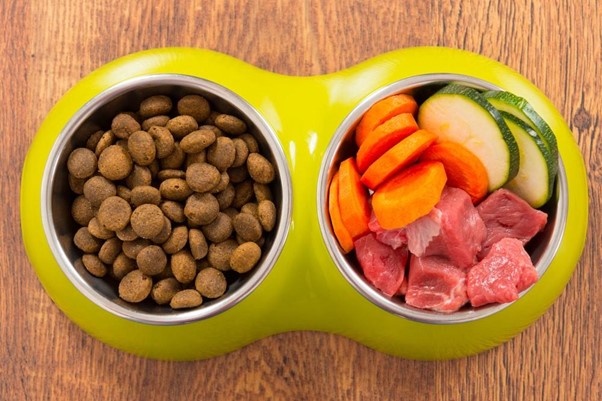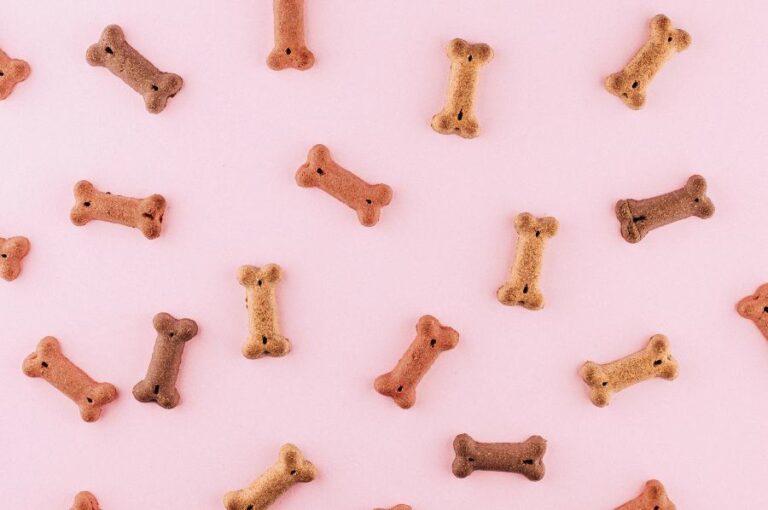Separating Fact from Fiction: Top 15 Myths About Dog Food Debunked
- Last updated on April 6, 2023
- By: Caroline Stowe
Are you a pet owner who’s been confused by all the conflicting information out there about dog food? Don’t worry—you’re not alone!
We’ve all heard it before — the myths about dog food that your neighbor is pedaling with or the old wives’ tales your grandma has been telling you since you were a child.
With so many opinions out there, it can be difficult to know what’s fact and what’s fiction. For any pet owner, when it comes to the health of your furry family member, you want to make sure you’re doing the best you can to nurture their well-being.
But it can be hard to know the difference between reality and a myth when it comes to dog food. To help clear up any confusion, let’s take a look at some of the most common myths about dog food—and bust them once and for all!
Revealing the Truth Behind 10 Popular Myths About Dog Food
Myth #1: Organic Dog Food Is Always Better Than Non-Organic
Organic foods may have some advantages compared to non-organic varieties due to their lack of artificial preservatives or chemicals that could potentially harm your pet in the long run.
But there’s no definitive proof that organic products are healthier than regular ones. In fact, if your pup has no medical issues or sensitivities, it’s more important to focus on providing him with a balanced diet rather than choosing organic dog foods over non-organic ones.
However, this doesn’t mean that organic automatically means better and healthier; it just means that it contains fewer additives.
Be sure to check labels carefully when selecting any type of food for your pup!
Myth #2: Homemade Meals Are Better Than Commerical Dog Foods
While homemade meals can be great for special occasions or during recovery periods after illness or injury, commerical dog foods offer complete nutrition specifically designed for canine companionship which homemade meals may lack depending on skill level in the kitchen!

Homemade diets may sound great in theory but they can actually be quite dangerous if done improperly. It’s difficult (if not impossible) to replicate all of the essential nutrients found in commercial dog foods without prior knowledge of canine nutrition science—plus it requires more time than many pet owners have available.
Be aware though that some homemade options can contain too much fat or not enough calcium so if going this route make sure to consult with a vet first before serving up any recipes yourself!
Unless you’re an animal nutritionist or veterinarian with experience creating homemade diets for dogs, it’s usually best to stick with commercially prepared foods that have been formulated by experts in canine nutrition.
Myth #3: Dogs Can Eat Anything That Humans Can
This is another myth that could potentially cause harm to your pet. Human foods such as chocolate, onions, garlic, grapes, raisins, alcohol, and caffeine can all be toxic to dogs.
It’s best to stick with specially formulated dog foods rather than experimenting with human foods that might not be suitable for your pooch.
Myth #4: Table Scraps are Good for Dogs
This one is definitely false! Table scraps should definitely be avoided unless they are specifically designed as treats or supplements meant for canine consumption.
Some table scraps tend to be high in fat and salt which can lead to serious health problems like pancreatitis. Also, certain human foods such as chocolate, garlic, and onions can be poisonous for dogs leading to digestive upset in dogs, so make sure you keep them away from Fido’s dish!
If you want to give your pup something special occasionally use something made specifically for them; there are lots of tasty treats made just with natural ingredients that will make your pup happy without making them sick!
While your pooch may be begging for human food, relying solely on leftovers can prevent him from getting all the nutrients he needs. Dogs have different dietary requirements than humans do and require specific vitamins and minerals in order to stay healthy and happy.
It’s best just to stick with dry kibble or wet food specifically formulated for dogs as these provide complete nutrition tailored to their needs.
Myth #5: Expensive Dog Food is Necessary
Pricey dog foods certainly exist but they aren’t necessary for a healthy pup! If you want to splurge on treats then go ahead but if you’re looking for an everyday meal pick something that fits within your budget but still offers quality nutrition.
Look at labels carefully to make sure you know what ingredients are in the product—cheap doesn’t always mean bad quality!
Myth #6: Dry Food is Better Than Wet Food
This myth mainly depends upon the individual pet’s needs. When it comes to choosing the best food for your pup, there is no one-size-fits-all answer. While some pet owners prefer wet food for its palatability and convenience, others may believe that dry kibble is the superior option.

Both wet and dry food has their own merits—it just depends on what works best for you and your pooch! Dry kibble helps keep teeth clean while wet food contains more moisture which makes it ideal for plaque formation in dogs who don’t drink enough water.
If you feed both wet and dry food together make sure each meal provides your pup with the same amount of nutrition.
Myth #7: Frozen or Canned Meat is Unhealthy For Pets
The myth about dog food that frozen or canned meat is unhealthy for dogs has been around since the beginning of the pet food industry. The truth is that this myth has more to do with how the meat is processed than what type of meats are used in production.
Canned and frozen meats are typically lower grade than fresh cuts, meaning they may contain a lower nutrient content or be higher in fat and sodium levels.
On the other hand, some good quality frozen and canned pet foods can offer similar nutrition as fresh meat. The key here is to read labels carefully and look for details such as ingredients, processing approach, and nutrition information before deciding which product to feed your pup.
Remember, fresh or frozen, all dog food should be monitored closely to ensure optimal health for your furry friend!
Myth #8: Grain-Free Diets Are Healthier
It can be tempting to think that grain-free diets are healthier for your pup, but this isn’t always true.
Whole grains contain essential nutrients like fiber, B vitamins, iron, zinc, and magnesium—all of which are vital for a healthy diet. Of course, using organic ingredients is always ideal but don’t feel like grain-free is the only way to go.
It just depends on what works best for your pup! Some dogs thrive on grain-free diets while others may need grains in order to stay healthy so take time to research different options before committing to one diet over another.
Make sure your dog is not diabetic, as it would require a grain-free diet. Again, be sure to check labels carefully when selecting a brand of food for your pup so that you can make an informed decision based on their individual needs.
Myth #9: Raw Diet Is Healthier Than Kibble
This myth has been around for a while but unfortunately, it’s not true either! Raw diets may appear more natural but they come with a whole host of risks including salmonella poisoning if not handled and stored properly.
Feeding your pup raw meat could also increase their risk of developing an infection or other medical complication so it’s best avoided unless prescribed by a veterinarian.
Myth #10: High Protein Diets are Best for Dogs
One of the biggest myths surrounding dog nutrition is that high-protein diets are best for dogs. As veterinarians and canine nutritionists will attest, however, that’s not always the case.
Protein is a vital part of any dietary plan for a dog, just like it is for humans; however, too much can cause serious health problems for the animal over time.
Depending on the size, age, breed, and activity levels of each individual dog, varying amounts of protein may be required – more is generally recommended for large active breeds such as pit bulls or huskies than small lapdogs or chihuahuas.
With careful consideration of your pup’s unique needs, you should have no difficulty finding them an appropriate diet tailored to their specific needs!
Myth #11: Dogs Need Meat Every Day
It’s a common misconception that dogs need meat every day as part of their diet but this isn’t entirely accurate.
While protein from animal sources is important for dogs—especially active ones—it should be balanced with other non-meat proteins like eggs or beans as well as fruits and vegetables for a complete meal plan.
Additionally, adding omega fatty acids helps keep your pup’s coat looking shiny and healthy!
Myth #12: Chewing Bones and Antlers Protect Teeth
Despite popular belief, feeding your pup chewing bones or antlers for dental health is more misguided than mischievous.
The age-old myth that ‘bone broth’ and antlers protect teeth doesn’t really have any basis in reality as the particles of bone from either source can become lodged in-between teeth, rubbing against the gumline and causing inflammation.

Not only are bits of bone a potential irritant, but they present a choking hazard. It’s best to stick with long-lasting chews such as rawhide to help keep teeth clean rather than feeding bones under the guise of dental health.
Myth #13: Puppies Don't Need Vitamins
It’s a common myth that puppies don’t need vitamins in their diets; while they may get some basic nutrients from dog food, it’s important to supplement with vitamins to ensure your pup is getting all the minerals and healthy components it needs for optimal health.
Despite what many pet parents might think, puppy food is actually similar to adult food but just in smaller portions – and that means puppies need vitamins just as adults do!
Puppy growth is rapid and vitally important, so turning a blind eye to vitamin supplements can lead to real developmental issues down the line.
A good rule of thumb for pup owners is: if you’re unsure about whether your pup needs supplemental vitamins, check in with your veterinarian. They’ll be able to provide advice on what types of vitamins would benefit your four-legged friend best.
Myth #14: Dogs Don't Need Supplements
This one isn’t entirely true as certain supplements such as glucosamine and turmeric can help support joint health in aging pups or provide additional energy before playtime.
However, be careful not to overdo it—your pup should get most of his nutrients from his regular meals so only use supplements after consulting with a veterinarian about what would benefit your pet specifically.
Myth #15: Treats Contain Empty Calories
The idea that treats are nothing more than empty calories when it comes to dog food is a pervasive myth – one that has been widely propagated, but not necessarily based on scientific fact.
We all want to do right by our four-legged family members and give them the best nutrition available, but with this common belief, it can be hard to know just how much of a treat is really okay for our furry friends.
The truth of the matter is that there are actually many dog treats on the market specifically developed for nutritional purposes, offering your dog not only tasty morsels but healthy vitamins and minerals as well.
With a bit of research, you can find treats that are both delicious and beneficial to your pet’s diet.
Check out some more dog food myths by clicking the video link below.
Conclusion
Taking care of our furry friends requires us to sift through facts from fiction when it comes to feeding them properly. This list only scratches the surface of some of the many popular myths out there.
By understanding the truth behind these common myths you will be able to make more informed decisions regarding what type of diet is right for furry friends!
Ultimately though it’s up to each individual pet owner to decide how best they want to feed their four-legged friend by researching various options and consulting professionals – because when it comes down to feeding our fur babies – knowledge really is power!
-
Author: Caroline Stowe
- Updated on April 6, 2023
Disclaimer: This article doesn’t intend to replace professional veterinary advice, nor should it be used as a substitute for veterinary services, diagnosis, or treatment. The content on this website, including information and opinions expressed herein, are intended for general informational purposes only. In case you have concerns or questions regarding your dog’s health and diet requirements, please consult your veterinarian before doing anything that might affect it.
DogPetGuide.com and the writer are not responsible or liable for any damage, liability, costs, or claims arising from any possible consequences of the reader’s action after reading this article.




